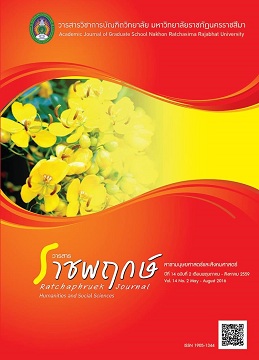ผีและอำนาจ ผ่านความเชื่อเรื่องผีของชาวไทยทรงดำ ตำบลพันเสา อำเภอบางระกำ จังหวัดพิษณุโลก
Main Article Content
Abstract
การวิจัยนี้มุ่งศึกษาความสัมพันธ์ระหว่างความเชื่อเรื่องผีกับอำนาจความชอบธรรมในระบบความสัมพันธ์ทางสังคมของไทยทรงดำ พื้นที่ตำบลพันเสา อำเภอบางระกำ จังหวัดพิษณุโลก วิธีการศึกษาใช้การวิจัยแบบเชิงคุณภาพ โดยตัวผู้วิจัยเป็นเครื่องมือวิจัย ควบคู่กับการสัมภาษณ์แบบไม่มีโครงสร้าง การสังเกตการณ์แบบมีส่วนร่วมและไม่มีส่วนร่วม ผลจากการศึกษา พบว่า ความเชื่อเรื่องผีปรากฏในการสร้างความชอบธรรมทางอำนาจในความสัมพันธ์ทางสังคมของชาวไทยทรงดำในพื้นที่ ความเชื่อเรื่องผีถูกแสดงออกในรูปแบบของการยอมรับว่าผีมีอยู่ในทางอำนาจเหนือธรรมชาติ การยอมรับในความเชื่อเรื่องผีถูกแสดงออกผ่านพิธีกรรมต่างๆ ของไทยทรงดำและการสืบสายตระกูล ซึ่งเป็นพื้นฐานของการจัดโครงสร้างและความสัมพันธ์ทางอำนาจในสังคม การจัดแบ่งโครงสร้างความสัมพันธ์ทางชนชั้นจะแบ่งออกเป็นผู้ต๊าวกับผู้น้อย รวมทั้งความสัมพันธ์ทางอำนาจในระบบครอบครัวที่ผู้ชายจะมีบทบาทสำคัญมากกว่าผู้หญิง โดยเฉพาะบทบาทในการทำหน้าที่สืบผีบรรพบุรุษ การนับถือผีเป็นการแสดงออกถึงความต้องการที่พึ่งยึดเหนี่ยวทางจิตใจของคนไทยทรงดำ เนื่องจากเชื่อว่าผีสามารถปกป้องรักษา คุ้มครองลูกหลานและคนในสังคมให้อยู่เย็นเป็นสุข ความสัมพันธ์ระหว่างคนกับผี เป็นความสัมพันธ์แบบเชิงต่อรอง เคารพและสำนึกในบุญคุณของผี ความเชื่อเรื่องผียังทำให้ความสัมพันธ์ภายในครอบครัว และเครือญาติของชาวไทยทรงดำมีความผูกพันสามัคคี แม้ว่าความสำคัญของผีนั้นจะเปลี่ยนแปลงไปตามสภาพของสังคมสมัยใหม่ แต่ความเชื่อเรื่องผีก็ยังคงเป็นโครงสร้างทางสังคมพื้นฐานของชาวไทยทรงดำและถือว่าเป็นกฎเกณฑ์ทางสังคมอย่างหนึ่ง
Ghosts and Power: Through Ghosts Believing of Thai Song Dum, Tambon Pun Sao, Bang Ra Gum, Phitsanulok
This research aims to study the relationship between the belief in ghosts and the legitimacy power in the social relationship system of Thai Song Dum in Tambon Pan Sao, Bang Ra Gum, Phitsanulok. The qualitative research method and the non–structure interview were used as research tools, included the participant and non–participant observation in the fieldwork study. The research result showed that the belief was embodied in the legitimacy power of Thai Song Dum’s social relationship. The belief in ghosts had expressed by acceptance that ghosts existed as the supernatural power and they were the major part of Thai Song Dum’s rituals practices. Besides, the ghost belief also conducted the role of the descendant in heir, which was the base of social structure and power relationship in the social system. The class relation structure was divided into “Phu Tao” (Upper class) and “Phu Noi” (Lower class). Males had the important roles than females in the power relations of family system, especially the role in connecting with the ancestor ghosts. It was a custom as well as an inheritance of Thai Song Dum families. The ghost worship also reflected the local people’s demand in spiritual refuge. They believed that ghosts protected them and made they live in happiness. The relationship between humans and ghosts showed in the bargaining relationship, respecting, and recognizing in the favors supported by ghosts. Moreover, the belief encouraged the harmony insides Thai song Dum’s families and relatives. Even though, the importance of ghosts had changed in the modern time, the ghost beliefs were still the social structure base of Thai Song Dum’s social system and as the rule of their society.

